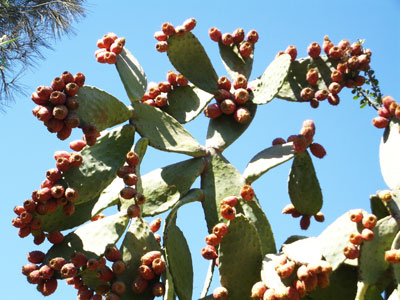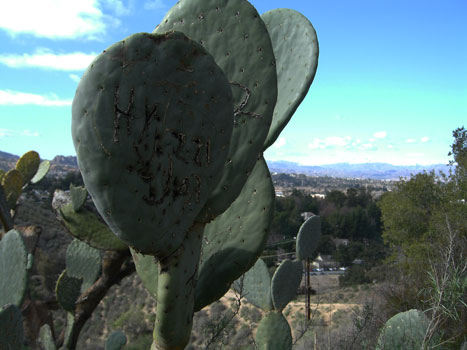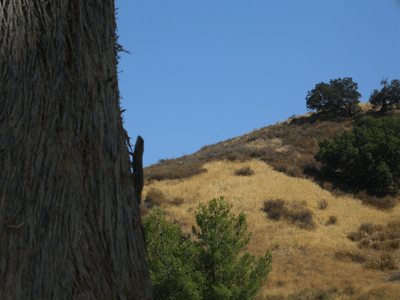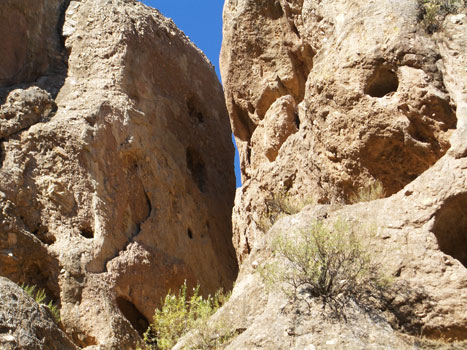The Desert...

Cactus, CSUN Campus, Northridge, CA, 2008 (Photo: K.Anderberg)
"What do the coyotes mean when they yodel at the moon? What are dolphins trying so patiently to tell us? Precisely what did those two enraptured gopher snakes have in mind when they came gliding toward my eyes over the naked sandstone? If I had been as capable of trust as I am susceptible to fear I might have learned something new or some truth so very old we have all forgotten it." - Edward Abbey, 1968
"Desert is the name it wears on the maps, but the Indian's is the better word. Desert is a loose term to indicate land that supports no man; whether the land can be bitted and broken to that purpose is not proven. Void of life it never is, however dry the air and villainous the soil. That is the nature of that country." - Mary Austin, 1903

William S. Hart Park, Saugus, CA, 2008 (Photo: K.Anderberg)
"So are great reaches of our western desert, scarred somewhat by prospectors but otherwise open, beautiful, waiting, close to whatever God you want to see in them…Save a piece of country like that intact, and it does not matter in the slightest that only a few people every year will go into it. That is precisely its value. Roads would be a desecration, crowds would ruin it…That is the reason we need to put into effect, for its preservation, some other principle than the principles of exploitation or "usefulness" or even recreation. We simply need that wild country available to us, even if we never do more than drive to its edges and look in. For it can be a means of reassuring ourselves of our sanity as creatures, a part of the geography of hope." - Wallace Stegner, 1960

Cactus on CSUN campus, Northridge, CA, 2008 (Photo: K.Anderberg)
"There is nothing remarkable about the desert clouds - that is nothing very different from the clouds of other countries - except in light, color, and background.
They appear incomparably more brilliant and fiery here than elsewhere on the globe. The colors, like everywhere else on the desert, are intense in their power, fierce in their glare. They
vibrate, they scintillate, they penetrate and tinge everything with their hue..." - John C. Van Dyke
"Often, alone in an endless open desert, I find it hard to believe that the rest of the world exists…" - Everett Ruess, 1934

Lizard on tree in summer heat, Castaic, CA, 2008 (Photo: K.Anderberg)
"If you know the rainfall of a region you can make a pretty accurate guess as to the density of color of its wildlife inhabitants. For evolution favors dark-hued creatures in the deep woods just as it favors light-colored creatures on the open desert." - Edwin Way Teale, 1956
"Was there ever such a stillness as that which rests upon the desert at night! Was there ever such a hush as that which steals from star to star across the firmament! You perhaps think to break the spell by raising your voice in a cry; but you will not do so again. The sound goes but a little way and then seems to come back to your ear with a suggestion of insanity about it…Overhead the planets in their courses make no sound, the earth is still, the very animals are mute. Why then the cry of humans? How it jars the harmonies! How it breaks in discord upon the unities of earth and air and sky! Century after century that cry has gone up, mobbing high heaven; and always insanity in the cry, insanity in the crier. What folly to protest where none shall hear! There is no appeal from the law of nature. It is made for beast and bird and creeping thing. Will the human never learn that in the eye of the law he is not different from the things that creep?" - John C. Van Dyke, 1901

Sandstone rocks in Bouquet Canyon, Saugus, CA, 2008 (Photo: K.Anderberg)
"Perhaps this is the loveliest hour of the day, though it is hard to choose. Much depends on the season. In midsummer, the sweetest hour begins at sundown, after the awful heat of afternoon. But now, in April, we'll take the opposite, that hour beginning with the sunrise…" - Edward Abbey, 1968
"The quick increase of suns at the end of spring sometimes overtakes birds in their nesting and effects a reversal of ordinary manner of incubation. It becomes necessary to keep the eggs cool rather than warm." - Mary Austin, 1903
"We were evidently on the verge of the desert which had been reported to us; and the appearance of the country was so forbidding that I was afraid to enter it, and determined to bear away to the southward, keeping close along the mountains, in the full expectation of reaching the Buenaventura River." - John C. Fremont, 1845

Cactus, CSUN Campus, Northridge, CA, 2008 (Photo: K.Anderberg)
"What do the coyotes mean when they yodel at the moon? What are dolphins trying so patiently to tell us? Precisely what did those two enraptured gopher snakes have in mind when they came gliding toward my eyes over the naked sandstone? If I had been as capable of trust as I am susceptible to fear I might have learned something new or some truth so very old we have all forgotten it." - Edward Abbey, 1968
"Desert is the name it wears on the maps, but the Indian's is the better word. Desert is a loose term to indicate land that supports no man; whether the land can be bitted and broken to that purpose is not proven. Void of life it never is, however dry the air and villainous the soil. That is the nature of that country." - Mary Austin, 1903

William S. Hart Park, Saugus, CA, 2008 (Photo: K.Anderberg)
"So are great reaches of our western desert, scarred somewhat by prospectors but otherwise open, beautiful, waiting, close to whatever God you want to see in them…Save a piece of country like that intact, and it does not matter in the slightest that only a few people every year will go into it. That is precisely its value. Roads would be a desecration, crowds would ruin it…That is the reason we need to put into effect, for its preservation, some other principle than the principles of exploitation or "usefulness" or even recreation. We simply need that wild country available to us, even if we never do more than drive to its edges and look in. For it can be a means of reassuring ourselves of our sanity as creatures, a part of the geography of hope." - Wallace Stegner, 1960

Cactus on CSUN campus, Northridge, CA, 2008 (Photo: K.Anderberg)
"There is nothing remarkable about the desert clouds - that is nothing very different from the clouds of other countries - except in light, color, and background. They appear incomparably more brilliant and fiery here than elsewhere on the globe. The colors, like everywhere else on the desert, are intense in their power, fierce in their glare. They vibrate, they scintillate, they penetrate and tinge everything with their hue..." - John C. Van Dyke
"Often, alone in an endless open desert, I find it hard to believe that the rest of the world exists…" - Everett Ruess, 1934

Lizard on tree in summer heat, Castaic, CA, 2008 (Photo: K.Anderberg)
"If you know the rainfall of a region you can make a pretty accurate guess as to the density of color of its wildlife inhabitants. For evolution favors dark-hued creatures in the deep woods just as it favors light-colored creatures on the open desert." - Edwin Way Teale, 1956
"Was there ever such a stillness as that which rests upon the desert at night! Was there ever such a hush as that which steals from star to star across the firmament! You perhaps think to break the spell by raising your voice in a cry; but you will not do so again. The sound goes but a little way and then seems to come back to your ear with a suggestion of insanity about it…Overhead the planets in their courses make no sound, the earth is still, the very animals are mute. Why then the cry of humans? How it jars the harmonies! How it breaks in discord upon the unities of earth and air and sky! Century after century that cry has gone up, mobbing high heaven; and always insanity in the cry, insanity in the crier. What folly to protest where none shall hear! There is no appeal from the law of nature. It is made for beast and bird and creeping thing. Will the human never learn that in the eye of the law he is not different from the things that creep?" - John C. Van Dyke, 1901

Sandstone rocks in Bouquet Canyon, Saugus, CA, 2008 (Photo: K.Anderberg)
"Perhaps this is the loveliest hour of the day, though it is hard to choose. Much depends on the season. In midsummer, the sweetest hour begins at sundown, after the awful heat of afternoon. But now, in April, we'll take the opposite, that hour beginning with the sunrise…" - Edward Abbey, 1968
"The quick increase of suns at the end of spring sometimes overtakes birds in their nesting and effects a reversal of ordinary manner of incubation. It becomes necessary to keep the eggs cool rather than warm." - Mary Austin, 1903
"We were evidently on the verge of the desert which had been reported to us; and the appearance of the country was so forbidding that I was afraid to enter it, and determined to bear away to the southward, keeping close along the mountains, in the full expectation of reaching the Buenaventura River." - John C. Fremont, 1845
Some of My Favorite Desert Resources
- Mojave National Preserve
- Death Valley National Park
- Bighorn Mountain Wilderness
- Carrizo Plain National Monument
- San Jacinto National Monument
- The Old Woman Meteorite in Barstow
- South Nopah Range Wilderness
- Saddle Peak Hills Wilderness
- Sacatar Trail Wilderness
- Pahrump Valley Wilderness
- Nopah Range Wilderness
- Newberry Mountains Wilderness
- Hollow HIlls Wilderness
- Funeral Mountains Wilderness
- Cleghorn Lakes Wilderness
- Joshua Tree National Park
- California Desert Protection Act
- The Desert Protective Council